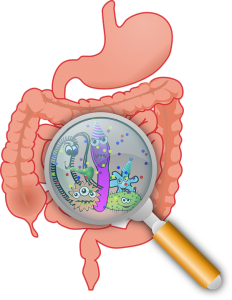 Although some fats are healthy in a balanced diet, too much of anything can be a harmful thing. For some people, like those with irritable bowel syndrome, too much fat in the diet may cause digestive distress. And for those with conditions like pancreatitis, fat is not digested well, so must be limited in the diet. Recent research shows that anyone, no matter their health status, may be at risk for gut health issues on a high fat diet.
Although some fats are healthy in a balanced diet, too much of anything can be a harmful thing. For some people, like those with irritable bowel syndrome, too much fat in the diet may cause digestive distress. And for those with conditions like pancreatitis, fat is not digested well, so must be limited in the diet. Recent research shows that anyone, no matter their health status, may be at risk for gut health issues on a high fat diet.
What exactly is gut health?
When you hear about gut health, probiotics may come to mind. Probiotics are good bacteria that are important to help balance the health of the gut microbiome. It’s a vital part of gut health. You can consume probiotics through daily supplements that are diverse and potent. However, if you prefer, you can also consume probiotics through fermented foods like yogurt, sauerkraut, kimchi, and kombucha, for example.
In order to make sure those probiotics thrive, it’s also important to feed those good bacteria and protect the gut. Therefore, you can feed the gut bacteria by eating foods known as prebiotics. Prebiotics are fibers that help feed probiotics. Such prebiotic foods include asparagus, yams, and bananas, to name a few. The more diverse the gut bacteria in your gut, the healthier your gut and in turn your body.
All about fats
High fat diets have been all the rage in recent days from keto to low carb diets. These diets may have some benefits such as weight loss and helping to control blood glucose levels. This however is likely when people consume mostly healthy, unsaturated fats in their diet. Research shows that when people replace saturated fat content with unsaturated fat content, they have heart health benefits.
Saturated fats include those in foods such as dairy, fatty meats, butter, and some vegetable oils, to name a few. On the other hand, unsaturated fats include foods such as avocado, nuts, seeds, and plant-based oils like olive, coconut, and avocado oils.
Fat intake and gut health
A recent study looked at the impact of a high fat diet on the gut microbiome. A 6-month trial placed healthy people on either a low, moderate, or high fat diet. Blood and fecal samples were tested at baseline and after the study to assess gut health.
Study results show that the lower fat diet produced the highest alpha bacterial diversity, or richness of bacterial species in the gut as compared to the high fat diet. Also, those in the high fat diet had changes to long-chain fatty acid metabolism. This in turn resulted in higher levels of chemicals that could potentially trigger inflammation. Higher levels of inflammation in the body can lead to increased risk of chronic inflammatory diseases like heart disease and diabetes, to name a few.
Researchers suggest that those who traditionally consume a high carbohydrate, low fat diet who transition to a higher fat diet may be at most risk for high fat diet-related health risks. Further studies need to be done to see if those already on a moderate fat diet may be at health risk if they transition to a high fat diet.
Other ways to help gut health
Besides balancing the fat intake in your diet, there are other ways to help improve your gut health. Follow the tips below to help your gut feel happier and healthier today.
- Consume plenty of fruits and vegetables each day. Fruits and vegetables contain a variety of gut-friendly fibers and antioxidants. The antioxidants can help reduce inflammation in the body and strengthen immunity. This can reduce chronic disease risk and improve overall health status.
- Take a daily gut health supplement. If you don’t feel like you eat enough produce each day, then a probiotic supplement may be helpful for you. One such supplement is Biovia 30 by Vita Sciences. Biovia 30 contains 30 billion organisms from 10 different strains of healthy bacteria.
- Limit inflammatory behaviors. Lifestyle behaviors like smoking, drinking caffeine, and consuming alcohol can all negatively impact gut health. Therefore, limit or avoid such activities to lower your chronic disease risk and improve your gut and overall health.
-written by Staci Gulbin, MS, MEd, RD of LighttrackNutrition.com
 You may know that many people suffer from heart disease. However, you may not know that heart disease is the number one leading cause of death in the United States. Therefore, it’s important to know what puts you at risk for heart disease. This way you can work to prevent such risk factors and in turn lower your risk of heart disease. So, read below and find out how you can lower your risk of heart disease including reducing your risk of heart attack.
You may know that many people suffer from heart disease. However, you may not know that heart disease is the number one leading cause of death in the United States. Therefore, it’s important to know what puts you at risk for heart disease. This way you can work to prevent such risk factors and in turn lower your risk of heart disease. So, read below and find out how you can lower your risk of heart disease including reducing your risk of heart attack. Stroke continues to be one of the top ten leading causes of death in the United States. And even if a person survives a stroke, they may face permanent disability from a stroke. In turn, having a stroke could greatly impact a person’s quality of life. This is why it’s so important to keep learning more about how this disease can be prevented. A recent study shows that taking a fish oil supplement each day may help lower risk of stroke.
Stroke continues to be one of the top ten leading causes of death in the United States. And even if a person survives a stroke, they may face permanent disability from a stroke. In turn, having a stroke could greatly impact a person’s quality of life. This is why it’s so important to keep learning more about how this disease can be prevented. A recent study shows that taking a fish oil supplement each day may help lower risk of stroke. You can’t talk about a heart healthy lifestyle without at least referring to the Mediterranean diet. That’s because this Greek-style eating plan is full of heart healthy foods and other healthful tips. But did you know that this diet is also good for brain health? Recent research shows that certain nutrients found in the Mediterranean diet can help with brain health aging in older adults.
You can’t talk about a heart healthy lifestyle without at least referring to the Mediterranean diet. That’s because this Greek-style eating plan is full of heart healthy foods and other healthful tips. But did you know that this diet is also good for brain health? Recent research shows that certain nutrients found in the Mediterranean diet can help with brain health aging in older adults. When you think of celebrating the holidays, sweet treats, comfort foods, and holiday-flavored spirits may come to mind. Although it’s definitely ok to indulge a little during the holidays, too much of anything can sabotage your healthy lifestyle efforts. And with the new year rolling around soon, you should think ahead and make a plan. Because once this holiday season is over, the new year will surely bring about new celebrations with more food and drink temptations. And recent research shows that by drinking less alcohol, you could increase your chances for weight loss success.
When you think of celebrating the holidays, sweet treats, comfort foods, and holiday-flavored spirits may come to mind. Although it’s definitely ok to indulge a little during the holidays, too much of anything can sabotage your healthy lifestyle efforts. And with the new year rolling around soon, you should think ahead and make a plan. Because once this holiday season is over, the new year will surely bring about new celebrations with more food and drink temptations. And recent research shows that by drinking less alcohol, you could increase your chances for weight loss success. Now if you’ve ever tried to lose weight, which many of us have, then I’m sure you’ve heard the term metabolism. Usually you are told you either have “good” or “bad” metabolism. The only thing you may be sure of is that if you have a “bad” one then it will be harder for you to lose weight. But have you ever wondered what exactly this term means? If so, read below for some background on metabolism and a surprising look into how many of us have metabolic issues and what to do about it.
Now if you’ve ever tried to lose weight, which many of us have, then I’m sure you’ve heard the term metabolism. Usually you are told you either have “good” or “bad” metabolism. The only thing you may be sure of is that if you have a “bad” one then it will be harder for you to lose weight. But have you ever wondered what exactly this term means? If so, read below for some background on metabolism and a surprising look into how many of us have metabolic issues and what to do about it. Vegan diets have seemed to gain popularity over the years for several reasons. First of all, a plant-based diet full of fiber and antioxidants seems to improve heart health risk factors. Secondly, it’s a way for people to show they support animal rights. Also, it’s an eating regimen that can be fitting for those who may have dairy and or egg allergies. However, recent research shows that a vegan diet could also help improve the health of body and mind of those with type 2 diabetes.
Vegan diets have seemed to gain popularity over the years for several reasons. First of all, a plant-based diet full of fiber and antioxidants seems to improve heart health risk factors. Secondly, it’s a way for people to show they support animal rights. Also, it’s an eating regimen that can be fitting for those who may have dairy and or egg allergies. However, recent research shows that a vegan diet could also help improve the health of body and mind of those with type 2 diabetes.  It may seem like common sense that living a healthier lifestyle can lower your disease risk. but what exactly is a healthier lifestyle? With so much information on health and wellness in the media, it can be hard to know what healthy really is. From low carb to keto to fasting, each diet plan claims to be the best and healthiest. However, the healthiest eating regimen is going to be the one that makes your unique body feel its best and that you can stick with for the long term. Not to mention, that being healthy is about more than just diet. Staying active, managing stress, and sleeping well enough are just some behaviors that affect health. Recent research shows that leading a healthier lifestyle can reduce your stroke risk and in turn improve your quality of life.
It may seem like common sense that living a healthier lifestyle can lower your disease risk. but what exactly is a healthier lifestyle? With so much information on health and wellness in the media, it can be hard to know what healthy really is. From low carb to keto to fasting, each diet plan claims to be the best and healthiest. However, the healthiest eating regimen is going to be the one that makes your unique body feel its best and that you can stick with for the long term. Not to mention, that being healthy is about more than just diet. Staying active, managing stress, and sleeping well enough are just some behaviors that affect health. Recent research shows that leading a healthier lifestyle can reduce your stroke risk and in turn improve your quality of life. It’s well-known that healthy fats can help improve heart health. But did you know that they could also help you stay healthy all over as you get older? Omega-3 fatty acids are a form of unsaturated healthy fats. You can find these fatty acids in plant-based oils and vegetables like avocado. However, you can also find healthy fats in seafood like fatty fish. It’s this latter form of fatty acids that has been studied recently in connection with aging. Let’s take a look at what omega-3 fatty acids are, where you can find them, and how they can help you stay healthy as you age.
It’s well-known that healthy fats can help improve heart health. But did you know that they could also help you stay healthy all over as you get older? Omega-3 fatty acids are a form of unsaturated healthy fats. You can find these fatty acids in plant-based oils and vegetables like avocado. However, you can also find healthy fats in seafood like fatty fish. It’s this latter form of fatty acids that has been studied recently in connection with aging. Let’s take a look at what omega-3 fatty acids are, where you can find them, and how they can help you stay healthy as you age. If you have diabetes, you may or may not know that you are at higher risk for heart disease than those who don’t have diabetes. However, in addition to heart disease, you could also be at risk for bone health issues. This risk was discovered in a recent study that found those with diabetes were at higher risk for osteoporosis than those without diabetes. Therefore, this finding warrants further research on this risk. And in turn, standard diabetes diet and supplement treatments may need to be revised to account for this higher risk.
If you have diabetes, you may or may not know that you are at higher risk for heart disease than those who don’t have diabetes. However, in addition to heart disease, you could also be at risk for bone health issues. This risk was discovered in a recent study that found those with diabetes were at higher risk for osteoporosis than those without diabetes. Therefore, this finding warrants further research on this risk. And in turn, standard diabetes diet and supplement treatments may need to be revised to account for this higher risk.